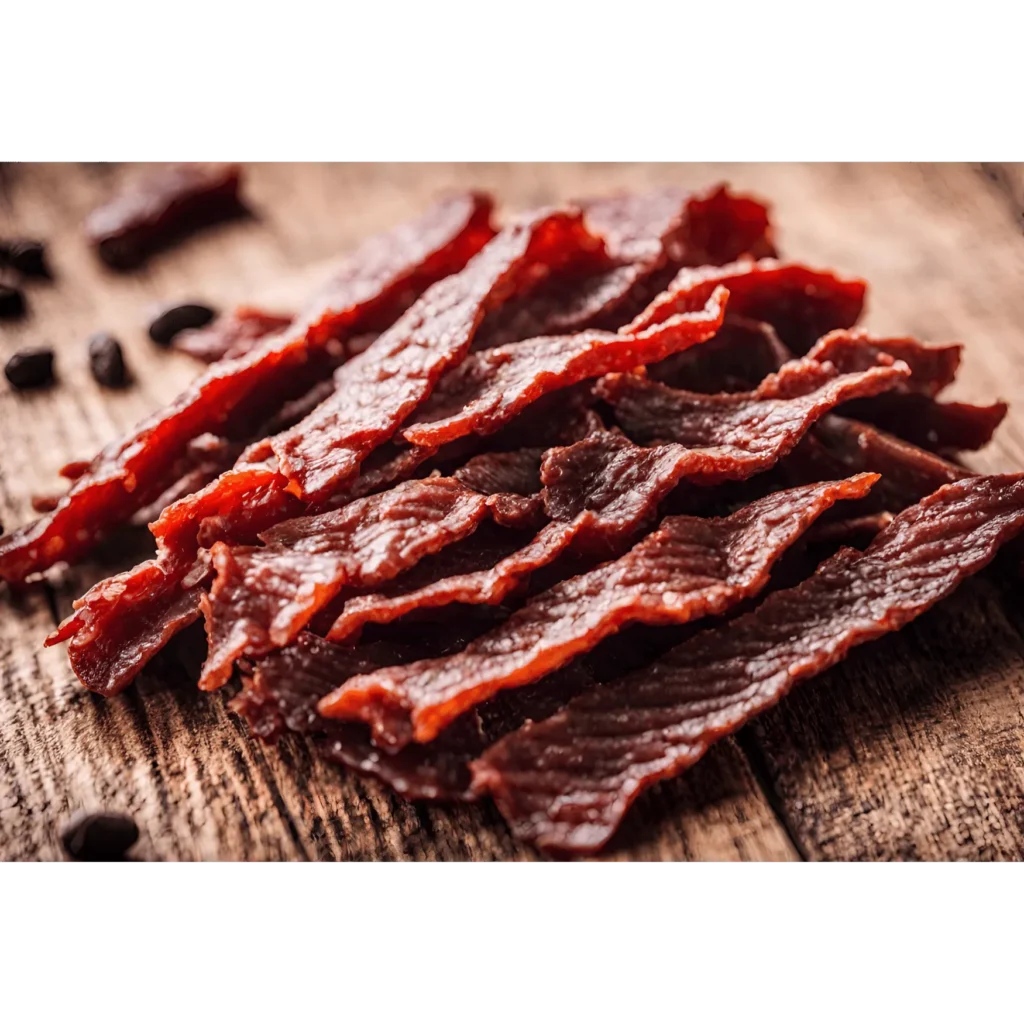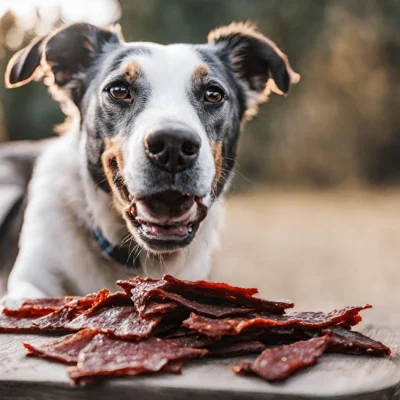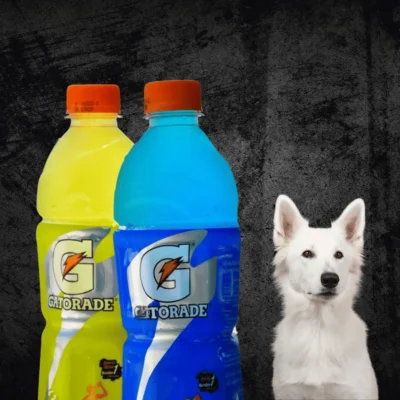Dogs have a natural love for beef, a trait passed down from their carnivorous wolf ancestors, who hunted for survival. Beef jerky is simply dried meat, which, on the surface, might seem like a suitable snack for dogs. However, not all meat products are automatically beneficial for a dog’s health. If you’ve ever wondered, “Is beef jerky safe for dogs?” the answer is a solid “It depends.” Join us as we tell you everything you need to know about the compatibility of jerked meat with your furry friend.
In this blog post, we will explore whether dogs can eat beef jerky. We’ll delve into the facts, discuss potential benefits, highlight feeding risks, and provide guidance on what to do if dogs consume spiced beef jerky. Additionally, we’ll elaborate on alternative snacks you can safely give your dog.
Here are the topics we’re going to discuss in this article:
- What is beef jerky?
- Is beef jerky safe for dogs?
- Beef jerky nutrition facts
- How to feed beef jerky to dogs
- What are the potential risks of feeding beef jerky to dogs?
- What should you do if your dog eats spiced beef jerky?
- What are the alternative snacks I can give my dog?
What is Beef Jerky?

Jerky is meat, poultry, or fish sliced into strips and dried to prevent spoilage. The extraction of water renders jerky exceptionally lightweight. Beef jerky is a type of dried, cured, and often seasoned meat, typically made from beef. It stands out as an excellent and healthy snack option. It boasts high protein content and low-calorie levels and serves as a rich source of essential minerals such as iron, zinc, and choline.
The process of making jerked meat involves slicing lean meat into thin strips, marinating it in a mixture of ingredients like salt, sugar, and various spices, and then drying it to remove moisture. The drying process helps preserve the meat, making it suitable for long-term storage without refrigeration.
Is Beef Jerky Safe for Dogs?

Beef jerky is generally considered safe for dogs to eat, as long as it comes from a single dried meat source and does not contain any additives or preservatives that might be unsafe for them. However, many commercially available beef jerky products designed for human consumption are laden with ingredients that may be harmful to dogs. This includes high levels of salt, spices, garlic, onion, and other seasonings that can be toxic to our four-legged friends.
That doesn’t mean your dog has to miss out on beef jerky entirely. You can explore alternatives such as homemade jerky, jerky dog treats available at pet stores, or natural varieties of beef jerky—all of which can be good options for your furry friend. If you have any doubts, talk to your veterinarian for guidance.
Beef Jerky Nutrition Facts:
The nutritional content of beef jerky can vary depending on the brand, type, and processing methods used. However, here’s a general overview of the key nutrients found in a typical 1-ounce (28-gram) serving:
Macronutrients:
- Calories: 116-150
- Protein: 9.4 grams
- Fat: 7.3 grams (including saturated, monounsaturated, and polyunsaturated)
- Carbohydrates: 3.1 grams
- Fiber: 0.5 gram
Vitamins and Minerals:
- Iron: 8% of the Daily Value (DV)
- Zinc: 21% of the DV
- Selenium: 5% of the DV
- Vitamin B12: 12% of the DV
- Potassium: 4% of the DV
- Folate: 9% of the DV
- Phosphorus: 9% of the DV
- Copper: 7% of the DV
- Choline: 6% of the DV
- Thiamine: 4% of the DV
- Niacin: 3% of the DV
How to Feed Beef Jerky to Dogs?
Similar to other meat forms, jerky is a valuable protein source, and its chewy texture can contribute to good dental health for your dog. Therefore, dogs can enjoy beef jerky, and it might offer them some benefits, as long as the snack is free from harmful ingredients. If you’re considering giving your dog biltong treats, here are some tips for guidance:
1. Home-Made Beef Jerky is Best:
Dog owners have the option to craft homemade beef jerky dog treats by drying meat at home. Creating dog-safe, natural beef jerky involves the simple process of drying lean beef with minimal additives.
It’s important to follow safe food handling practices to prevent contamination. Use lean meats, and avoid using ingredients that are harmful to dogs.
2. Check for Harmful Ingredients:
When offering beef jerky to your dog, carefully read the ingredient list to ensure there are no toxic substances like garlic, onion, or excessive salt. Avoid jerky products with additives and preservatives that might not be suitable for canine consumption.
Keep your dog’s beef jerky free of seasonings like onion powder and garlic powder to ensure a safe and healthy treat.
3. Fix Jerky With Low Sodium Content:
Dogs can’t handle the same sodium levels as humans; be cautious of the salt content in beef jerky. Special flavours like teriyaki, peppered, spicy, or soy sauce–glazed jerky often have excessive sodium, making them unsuitable for dogs.
Large quantities of spices, such as black pepper, can upset a dog’s stomach and potentially lead to excess urination.
4. Choose Dog-Friendly Jerky:
Numerous dog food companies produce a style of beef jerky specifically formulated for pets. Offer your dog this type of beef jerky, reserving the human-grade beef jerky for yourself. This ensures that your dog receives a treat tailored to their dietary needs and maintains their safety.
5. Avoid Xylitol:
When choosing or preparing treats for your dog, be vigilant and steer clear of any products containing xylitol. Xylitol is a sugar substitute often found in human foods but is highly toxic to dogs.
Even small amounts can cause a rapid release of insulin, leading to severe hypoglycemia, seizures, and, in some cases, death.
6. Moderation is Key:
When it comes to jerky, treat it as an occasional snack for your dog rather than a regular part of their diet. The high caloric content in jerky poses a risk of overconsumption, which can contribute to weight gain in dogs.
7. Size Matter:
When providing jerky to your dog, consider the size of the treats. Select smaller, bite-sized pieces to prevent potential choking hazards and to make it easier for your dog to chew and digest.
Choosing appropriately sized jerky ensures a safer and more enjoyable snacking experience for your furry friend.
What are The Potential Risks of Feeding Beef Jerky to Dogs?

Feeding beef jerky to dogs comes with certain drawbacks, and pet owners need to be aware of them:
High Sodium Content:
A key risk of feeding beef jerky to dogs is its high sodium content, which can lead to health issues such as increased thirst, urination, and potential sodium ion poisoning.
You should choose jerky treats carefully, provide products specifically formulated for dogs or homemade versions with controlled sodium levels, and consult with a veterinarian to ensure they align with your dog’s dietary needs.
Additives and Preservatives:
Feeding beef jerky to dogs poses a risk due to potential additives and preservatives. Commercial jerky products may contain ingredients like garlic, onion, and certain spices, which can be toxic to dogs and lead to gastrointestinal upset or more severe reactions.
Additionally, preservatives used in these products might not be suitable for canine consumption.
Digestive Issues:
The dehydration process used in making jerky can make it challenging for some dogs to digest, potentially leading to stomach upset, diarrhea, or other digestive problems.
It’s pivotal for pet owners to monitor their dog’s reaction to jerky treats and introduce them in moderation. If digestive issues persist or worsen, consulting with a veterinarian is advisable to ensure the dog’s health and well-being.
Choking Hazard:
Dogs may not always chew jerky thoroughly, especially if the pieces are large or if the dog is particularly enthusiastic. This increases the risk of choking, which can be a serious and immediate health concern.
To minimize this risk, pet owners should choose appropriately sized jerky treats or break larger pieces into smaller, more manageable portions.
Caloric Intake:
Feeding beef jerky to dogs poses a risk in terms of caloric intake. While jerky can be high in protein, it is also calorie-dense. Excessive consumption without considering the overall caloric content of a dog’s diet can lead to weight gain and obesity. Moderation is key to preventing overconsumption and maintaining a balanced diet.
Risk of Contamination:
Homemade or improperly stored jerky can be susceptible to bacterial contamination, posing health risks to dogs. Bacteria such as Salmonella or other pathogens may be present, leading to foodborne illnesses.
It’s key for you to ensure that jerky treats are prepared and stored hygienically. Choosing reputable commercial products with stringent quality controls can also reduce the risk of contamination.
What Should You Do If Your Dog Eats Spiced Beef Jerky?

If your dog accidentally consumes spicy beef jerky, it’s necessary to offer them ample water to help balance the high salt content. Ensure they stay hydrated, as excessive salt intake can lead to increased thirst. If your dog exhibits symptoms such as vomiting and diarrhea, contact your veterinarian for guidance.
For harmful ingredients like onions, garlic, or xylitol, seek immediate veterinary attention for monitoring. Acting promptly and providing the necessary information to your veterinarian can help address potential issues and safeguard your dog’s health.
What are The Alternative Snacks I Can Give My Dog?

If you’re seeking an alternative to beef jerky, there are numerous other snacks that you can offer your dog. Here are a few favourites:
- Fresh Fruits:
Dogs often enjoy fruits like apples (without seeds), blueberries, strawberries, or watermelon. These provide natural sweetness and essential nutrients.
- Fresh or Cooked Meat:
Lean meats like chicken, turkey, or fish are excellent sources of protein and essential nutrients. Offer them cooked, grilled, or baked in small pieces.
- Yogurt:
Plain, non-fat yogurt with a sprinkle of berries is a refreshing and protein-packed snack. Choose brands without artificial sweeteners or sugar.
- Carrot Sticks:
Crunchy and low in calories, carrot sticks are a great way to keep your dog entertained and satisfied.
- Green Beans:
Steamed or lightly roasted green beans offer vitamins and fibre without adding unnecessary calories.
- Pumpkin:
Plain, cooked pumpkin puree is a good source of fibre and beta-carotene. Avoid seasoned pumpkin products.
These are just a few suggestions, so feel free to get creative and mix and match different foods to discover what works best for your dog. Introduce new snacks gradually, monitor for any adverse reactions, and consult with your veterinarian for personalized dietary recommendations.
Final Thoughts:
In conclusion, the question of whether dogs can eat beef jerky depends on various factors. While beef jerky itself is generally safe for dogs, commercial products designed for human consumption may contain harmful additives and spices. To ensure your pet’s safety, it’s vital to choose carefully or consider homemade or dog-specific jerky treats.
The nutritional content of jerked meat can benefit dogs, providing protein and essential minerals. However, risks such as high sodium, additives, and the potential for digestive issues or choking hazards emphasize the importance of moderation and cautious selection.
If your dog accidentally consumes spiced beef jerky, ensure they stay hydrated, and seek veterinary attention if symptoms like vomiting or diarrhea occur. Also, consider alternative snacks like fresh fruits, lean meats, yogurt, carrot sticks, green beans, or pumpkin to diversify your dog’s diet. In short, always consult a veterinarian when deciding about your pet’s diet and health.
FAQs:
Can dogs eat beef jerky?
Yes, but it depends. Commercial jerky for humans may have harmful additives, so choose carefully or opt for dog-specific or homemade treats.
Is homemade beef jerky safe for dogs?
Yes, if made with lean meat and minimal additives. Practice safe food handling and consult your vet for guidance.
What are the nutritional benefits of beef jerky for dogs?
Beef jerky can offer dogs high-quality protein and essential minerals like iron, zinc, and choline. However, the nutritional content varies, so it’s important to check labels and choose wisely.
Are there risks associated with feeding beef jerky to dogs?
Yes, including high sodium, additives, digestive issues, choking hazards, and caloric intake concerns. Practice moderation and careful selection.
Are there alternative snacks for dogs besides beef jerky?
Yes, like fresh fruits, lean meats (cooked), yogurt, carrot sticks, green beans, and plain, cooked pumpkin puree.












